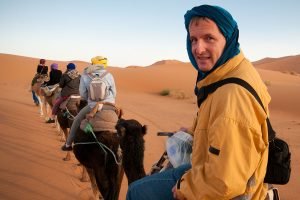Morocco
High Atlas Summits
9 Days 1950 ex Marrakech
Accommodation
2 Nights Hotel
6 Nights Refugio

Transportation
All on foot

Included Meals
8 Breakfasts
7 Lunches
6 Dinners

Trip Grade
Category 3
High Heart Rate Holiday
The Toubkal massif dominated by Jebel Toubkal at 4167m provides another five, 4000-meter peaks to climb. Your adventure starts in the bustling city of Marrakesh, with its small alleyways, beautiful palaces and souqs and exquisite architecture. One can really sense that this ancient town was an important trading and religious hub over the centuries.
From Marrakesh, we head south toward the High Atlas mountain range where we will be met by our local Berber team of experienced guides and assistants. Our accommodation throughout will be hotels in towns and the Toubkal Refuge set in the valley surrounded by the six 4000-meter peaks we will endeavour to climb.
“Traveling—it gives you home in thousand strange places, then leaves you a stranger in your own land”.
Ibn Battuta Berber Explorer
Each day we will set out early as to reach each summit before the heat of the day and be back at our base to rest and recuperate before trekking the following day.
This wonderful expedition is for those that love being in the remote away from the crowds. Many of these peaks no one visits as everyone is attracted to the highest peak of the massif, Jebel Toubkal. Join us and our expert team in Morocco to climb the six 4000-meter peaks of Mount Toubkal.
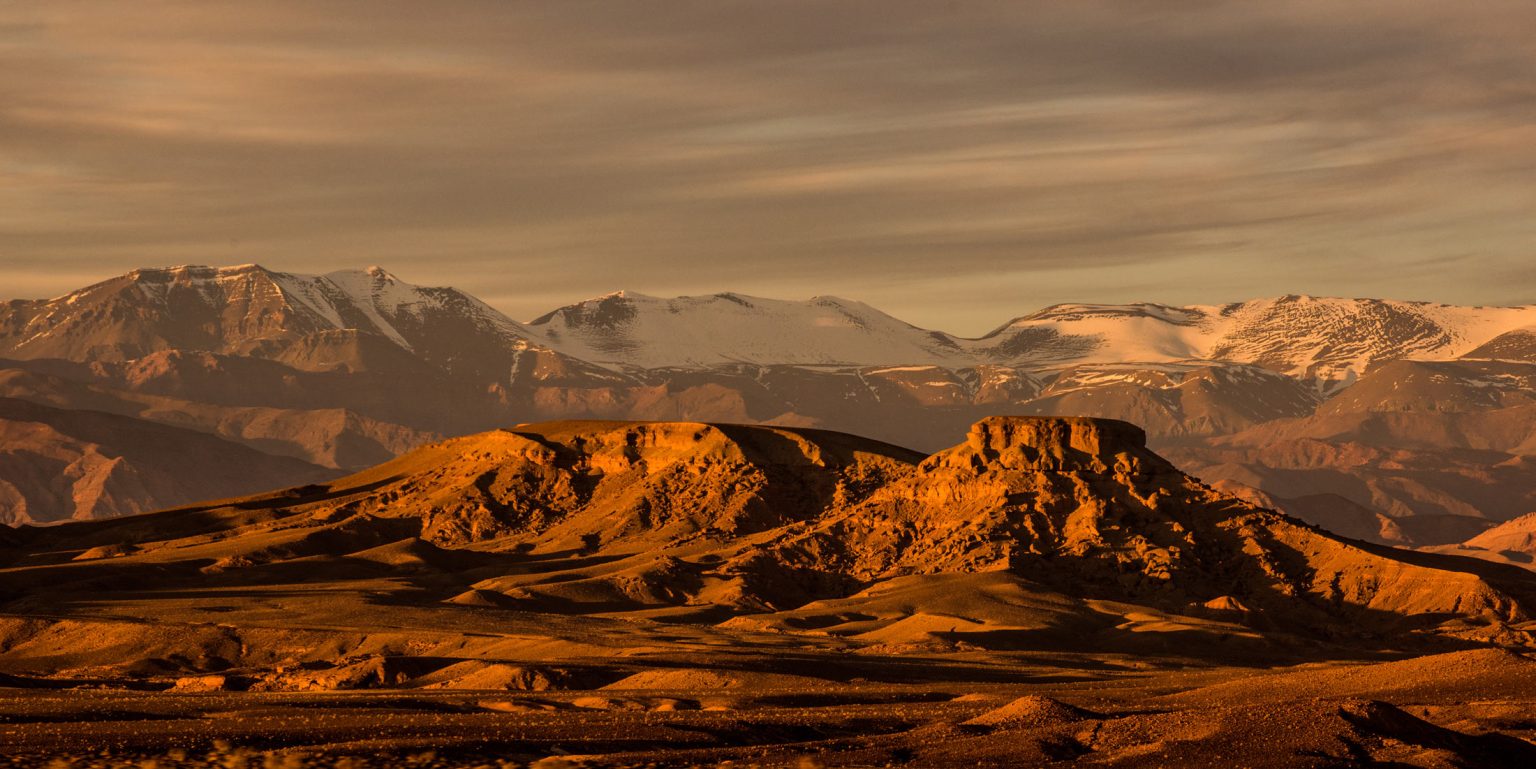
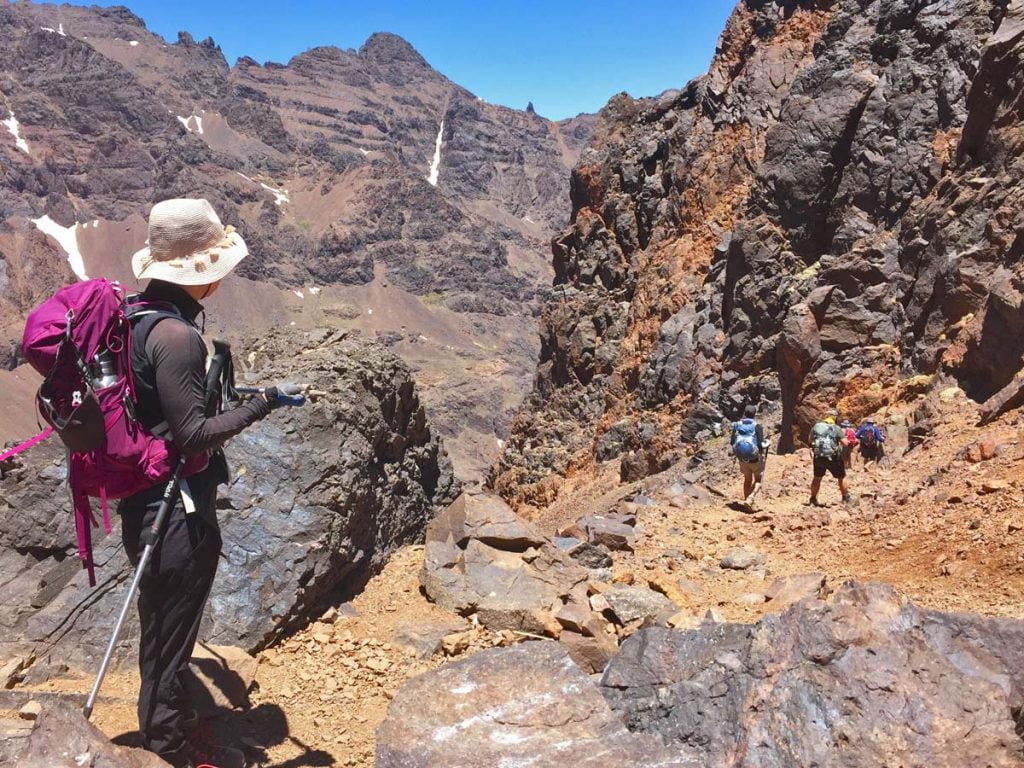
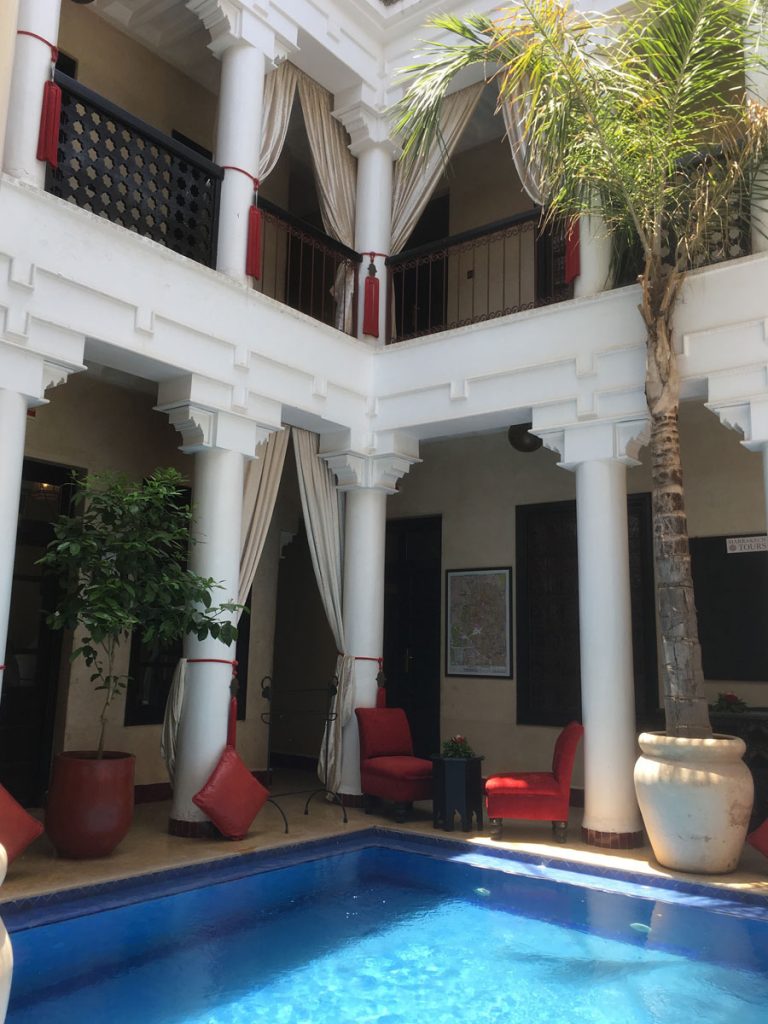
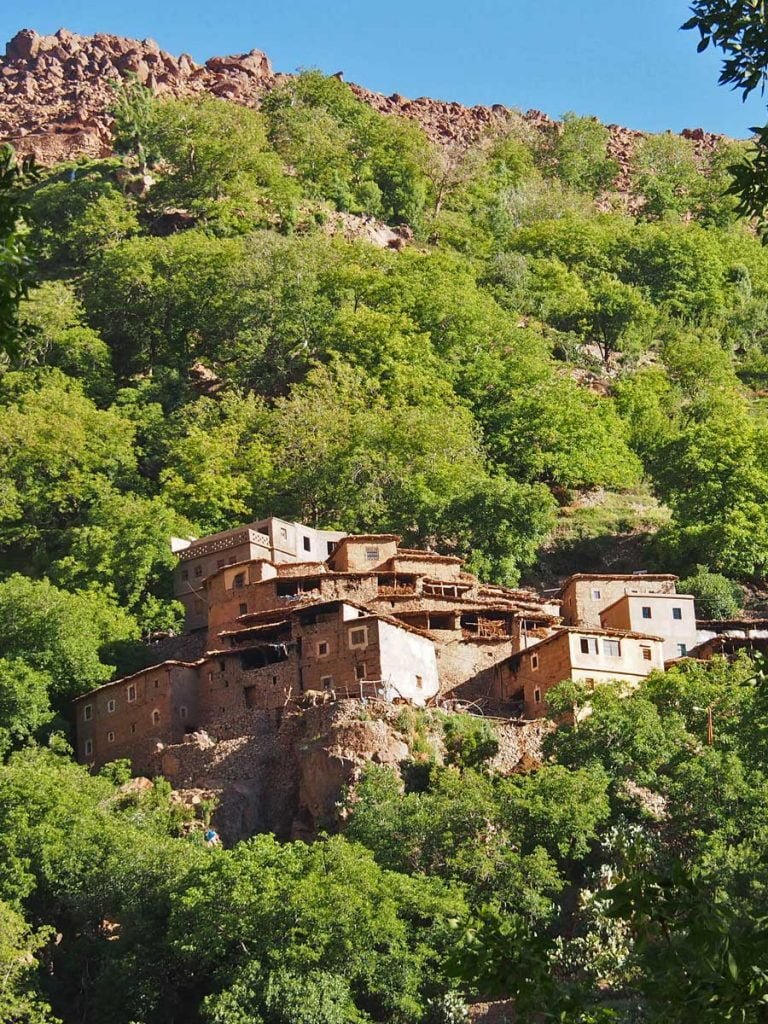
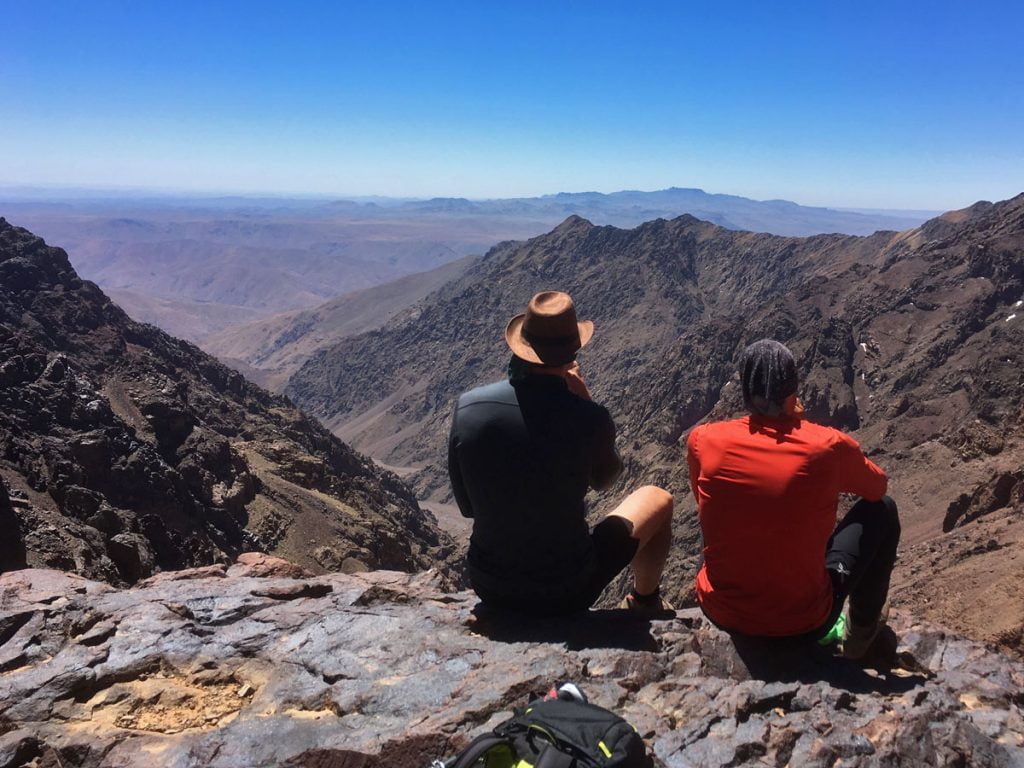
The Journey
Arrival at Marrakesh Airport where you will be picked up and transferred to the Riad Africa where you will spend the first night.
You will be picked up from your accommodation in Marrakech at 8.00am. Your driver will take you to the starting point of your trek at Imlil (1740m) where you will meet your guide and muleteer (about 1 ½ hour’s drive). Imlil is a large picturesque village set at the head of the Imlil Valley surrounded by walnut groves, apple trees and bisected by a rushing river. Once you have loaded up the mules, you will head off on your trek. Your first day is moderately challenging with a steady ascent up the Mizane Valley towards Mount Toubkal. On route, you’ll pass the shrine of Sidi Chamarouch. Then it’s onwards and upwards to the Toubkal Refuge – your stop for the night. Overall, you’ll have walked for five hours. (B,L,D)
Early in the morning, we make our attempt on the summit of Jebel Toukbal, the highest peak in Northern Africa. Our route takes us up the south cirque, crossing the stream above the refuge. The walking is relatively straightforward, but the scree and the altitude will make the going quite difficult in parts. The views along the way make the journey more than worthwhile. When you reach the summit you will see that the vistas across the surrounding landscape are quite breathtaking. From here there are unrestricted views in every direction, from the Marrakesh Plain to the High Atlas in the north and as far south as the Anti-Atlas and the Sahara. We will retrace our steps when we return down the mountain and spend the night at the refuge again. (B,L,D)
Early departure after breakfast as we did the second day. We climb to Ouanoukrim summit, second highest Summit in Morocco. After we descend back to the Refuge. (B,L,D)
Early departure after breakfast as we did the second day. We climb to Akyod 4030 m summit. After we descend back to the Refuge. (B,L,D)
Early departure after breakfast as we did the second day. We climb to Afella 4043 m summit. After we descend back to the Refuge. (B,L,D)
Early departure after breakfast as we did the second day. We climb to Biguinousene 4043 m summit. After we descend back to Refuge. (B,L,D)
After breakfast, you have a 4.30-hour trek back to Imlil then transfer back to Marrakesh. (B,L)
Transfer to airport or possibly another Morocco adventure. (B)
Single Supplement
Single Supplement is available for the Marrakesh portion only as Rifugios do not have single rooms. The cost for a Single Supplement is $350.
Journey Extensions
Check out our Journey Extensions for those that want to stay a little longer or try something different along the way.
Experience desert life on this wonderful journey with the legendary Berber. You will be transferred by our local team to the deserts of Morocco where you will be immersed in Berber life and traditions. Trek the sand dunes on camel back and sleep over night in a Berber tent before heading back to Marrakesh.
Day 1
Transfer from Marrakesh to Dades Gorge
Day 2
Transfer from Dades to Merzouga, via Todra Gorge. Ride camels
in the dunes.
Overnight in Berber tents
Day 3
Transfer from Merzouga to Zagora. Ride camels in the dunes.
Overnight in Berber tents
Day 4
Transfer from Zagora to Ouarzazate and visit Cazba
Ait Ben Haddou. Transfer to Marrakesh.
Accommodation in hotel Riad Bahia Salam
Day 5
Transfer to Marrakesh airport and return flight
Price
$700 per person twin share
Services Include:
- Accommodation at hotel Riad Bahia Salam in Marrakech with B&B service for 1 night
- Food during all the trek (breakfast, lunch, and dinner)
- Transfers from Marrakesh to Dades Gorge, Merzouga, Zagora, Ouarzate, and going back to Marrakesh
- Accommodations and meals in Dades Gorge, Merzouga, Zagora, and Ouarzate
- Local guide during the visit to Dades Gorge, Merzouga, Zagora, and Ouarzate
- Transfer from the hotel in Marrakesh to the airport.
Includes
- Guided by an expert team of Guides and assistants
- Accommodation at Riad Africa in Marrakesh (2 nights) with bed and breakfast service
- Transfer Marrakesh – Imlil
- Local guide, cook, and mule driver
- Mules to carry luggage, and food.
- Food during all the trek (breakfast, lunch, and dinner)
- Accommodation at Refuge Toubkal
- Transfer Imlil – Marrakesh
- Transfer from the hotel in Marrakesh to the airport
Excludes
- Flight to Marrakesh round trip
- Dinners in Imlil and Marrakesh
- Mineral water and drinks during the trekking
- Sleeping bag, clothes, and trekking equipment
- Insurance
Your Guides and Safety
Our lead guides are fully trained, registered, and licenced IFMGA members who work for us regularly. All mountain lovers, they have skied, climbed, and hiked many of the routes around the area and spend their days off exploring the region.
The entire Atlas Range extends for 2500 kilometres across northern Africa through Morocco, Algeria and Tunisia. The High Atlas has an average elevation of over 3000 meters.
The Best Time To Climb The High Atlas Summits 4000 meter Peaks
Climbing the High Atlas Summits can be done all year round. However, there are much better times to climb them than others. The best time to climb the High Atlas is mid-May to mid-June and then early September to early October. The reason for this is, that anytime before mid-May and the passes may be snowed over. After mid-June, the temperature on the trail can get above 40 C. Then the weather cools in early September for trekking again but this needs to be finished by early October as the passes start to receive snow again. We can climb these summits in winter, however, days are long as we need to snowshoe between summits and the weather can be bitterly cold.
Accommodation
In Marrakesh we stay in a very comfortable hotel called Hotel Riad Bahia Salam. Each room has its own bathroom and there is an excellent roof top garden and dining area. 6 nights are spent in Refuges similar to what you may find in Europe. These are basic places with shared bathrooms and meals are served in a communal room, prepared by our own team.

We get asked a lot of questions about our High Atlas Summits. The following are certainly the most common, however if you have another question please let us know or the answer may be found in our Trip Notes section.
How hard is the High Atlas Summits?
This is a high altitude trek through rugged and rocky terrain. While days are not particularly long, they can be difficult with several ascents and descents of over 1000 meters. You will after a day or so be acclimatised which will make going easier. And because we are not in any hurry, we can take our time, relish the landscape and the solitude.
Training is highly recommended for this trek.
You will be rewarded however with incredible views and very welcoming people along the way.
Do I Need Climbing Skills?
No. This is a trekking expedition, so no technical skills are needed nor technical equipment. A rugged pair of hiking boots is essential so as the terrain is rocky and tough on boots.
Is Morocco Safe?
We have never had any problems touring through Morocco. While you do need to be mindful when in the Souqs of Marrakesh for pickpockets, out on the trail the people are friendly and you will be treated with respect. Morocco is predominantly Muslim and as such women should remain covered (head wear is not needed) as much as possible.
What is the food like in Morocco?
The food in Morocco is not only delicious and fresh but it is also very colourful. Moroccan cuisine is generally very healthy, with a large range of vegetables and grains used alongside meat such as beef and lamb. While Moroccan cuisine uses a wide range of spices, giving it a rich and colourful appearance, the food is generally not spicy in the chilli sense.
Meals are often prepared in a Tagine (a clay pyramid style vessel) where food is kept fresh and delicious. Kefta or Morrocan meatballs and couscous are very popular dishes as well.
We are sure you will love the food made both in the towns and along the trail to Mt Toubkal.

I love being in these mountains. Doing the 6 summits of Toubkal is an honour. For days we will hardly see anyone. This is unusual these days and in Morocco. So I am sure you will love this trip as much as I do.
Lahoucein – Mountain Guide


